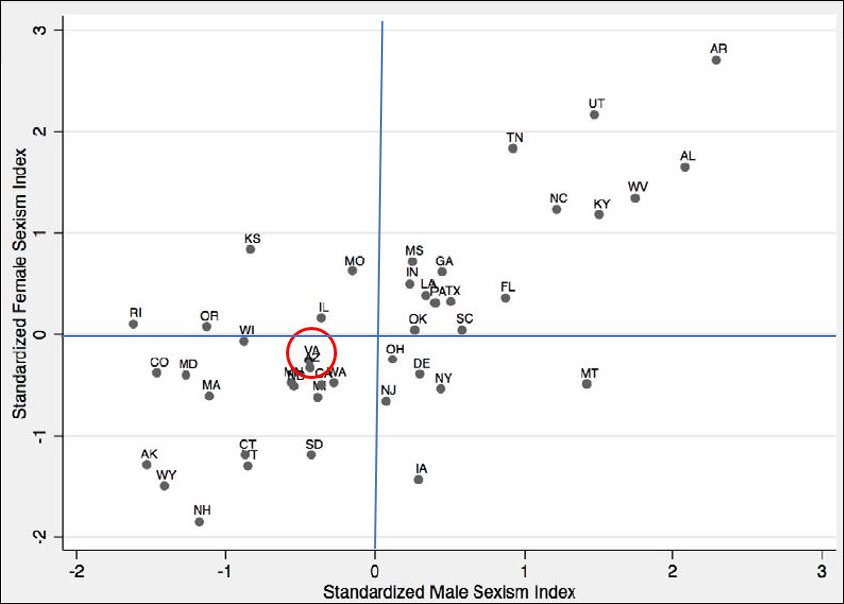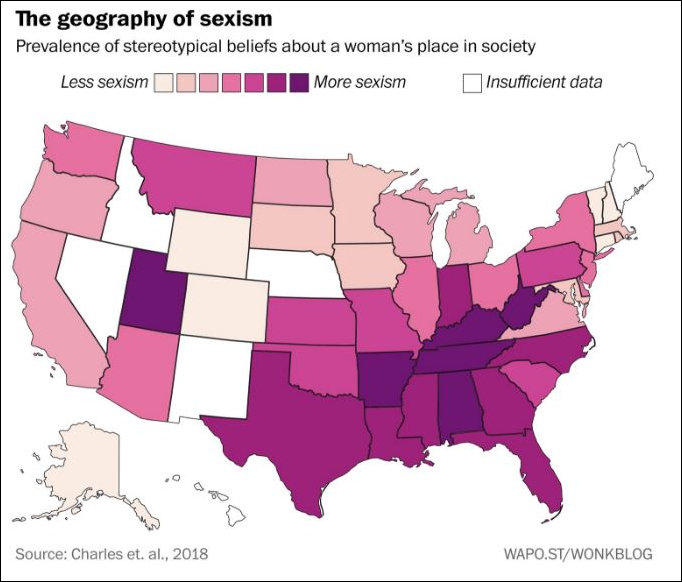Women of Virginia, great news! Your home state is the least sexist in the South and, though hardly a leader in workplace feminism, comparable in social attitudes to such havens of enlightenment as Maryland, California and Oregon.
That’s according to a new research paper, “The Effects of Sexism on American Women: The Role of Norms vs. Discrimination,” which examines how sexist attitudes in women’s home town (“formative sexism”) and their current residence (“residential sexism”) affect their workforce participation and earnings. The Washington Post uses the data today to publish the map atop this post in an article entitled, “The most sexist places in America.”
The study is both fascinating and infuriating. It contains some intriguing data about variations in social attitudes toward the role of women in society and displays an extraordinary bias to which the authors seem oblivious. Without a hint of irony they label “sexist,” a pejorative term that has no place in social science, beliefs others might call “traditional attitudes.” I am not competent to critique the authors’ statistical reasoning, but it is difficult to avoid the suspicion that deep and pervasive bias infects the study’s conclusions.
Write the authors:
In principle, sexism might take many forms but we focus on negative or stereotypical beliefs concerning the appropriateness of women engaging in market work rather than home production. Our analysis defines prevailing sexism in a market as the extent to which its residents believe: (i) that women’s capacities are inferior to men’s; (ii) that the family unit is hurt when women focus on activities outside the home; or (iii) that men and women should occupy specific, distinct roles in society.
The authors argue that the “sexist” beliefs of people around her “might affect a woman’s tastes, expectations, and beliefs, and thereby her choices and outcomes.” That’s another way of saying that a woman’s values and priorities are influenced by the culture in which she was raised and in which she is living. When stripped of the pejorative labeling, that’s not a terribly controversial proposition.
For the record I hew to the view that women should be free to pursue whichever path they choose, whether it is in the workplace, at home, or a balance of the two, in a manner that is consistent with their own values. I also think it is perfectly reasonable for women to take into account the views of friends and family members. I consider it extraordinarily demeaning to label as “sexist” a belief that there is value to a woman focusing on raising children, especially young children, at home.
That said, the questions in the national General Social Survey reveal interesting regional variations among both men and women. Consider the following scattergraph:

This contrasts the “sexism” — or traditional attitudes towards women’s roles — of men and women by state. Virginia falls below average in traditional attitudes for both men and women, although it is not far from the center. Also of note, the attitudes of men and women tend to be more similar than many other states.
(I would predict that if it were possible to break down Northern Virginia versus the Rest of Virginia, the great sociological divide in the state, NoVa would look more like Connecticut and RoVa would look more like Georgia.)
As for the study’s conclusion, can anyone doubt that the authors found what they expected to find? They wrap up their article this way: “Prejudice-based discrimination, undergirded by prevailing sexist beliefs, may be an important driver of womens outcomes in the U.S.”
Another way of expressing the data might be: “Women raised with traditional values and living in communities where traditional values predominate are more likely to spend more time raising children and keeping house, to spend less time in the workforce, to advance more slowly up the career ladder, and, accordingly, to get paid less than men on average.” If that constitutes “prejudice-based discrimination undergirded by prevailing sexist beliefs,” then so be it.


Leave a Reply
You must be logged in to post a comment.